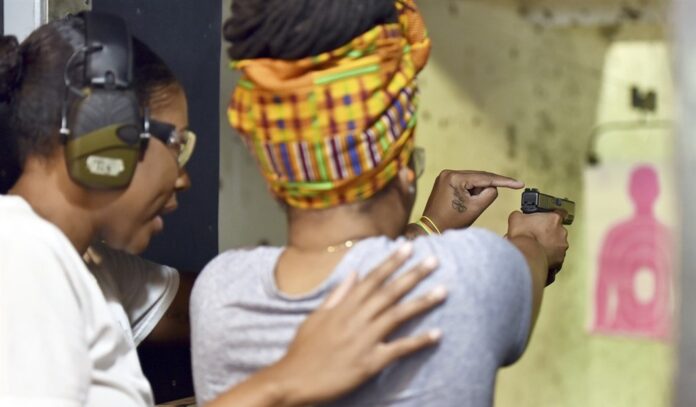David Yamane is a Professor of Sociology at Wake Forest University in Winston-Salem, North Carolina. He is a self-professed liberal on public policy and governance. Bucking the anti-gun ownership trend in the modern Left, Prof. Yamane is also a supporter of the right to keep and bear arms.
In a national environment in which political discourse is passionate, heated, and often angry, Yamane brings a refreshing Bob Ross-like calmness that’s much needed. His book, “Gun Curious: A Liberal Professor’s Surprising Journey Inside America’s Gun Culture,” brings that calm rationality and offers a fresh perspective on guns and gun ownership in America.
The book charts Yamane’s “conversion” from a non-gun owner to a “super owner” with more than a dozen guns. Reading his story was somewhat reminiscent of my own experience going from a “gun muggle” to a gun owner, an evangelist, and a firearms instructor. The difference in my personal story and Yamane’s is that my support for the right to keep and bear arms was almost instantaneous, after watching armed police run away and leave innocent people to be slaughtered during the Mumbai 2008 terrorist attack in India. (This lesson was reinforced by police cowardice at Parkland and Uvalde.) Yamane’s transition took years as he dipped his feet in the water, spent time with gun owners, slowly entered the broad gun culture of the United States, and most importantly, an unpleasant and potentially dangerous encounter during a neighbor’s domestic dispute.
The book has lots of data that a Second Amendment supporter can use in debating gun control supporters. Consider this excerpt:
On any given day, an overwhelming majority of America’s tens of millions of gun owners will not experience or cause any adverse outcomes with their hundreds of millions of guns. According to the National Center for Health Statistics, in 2019 there were 14,861 homicides using firearms. Even using the faulty assumption that a different person committed every homicide using a different gun, a mere 0.019 percent of gun owners and 0.0037 percent of guns are involved in firearm homicides annually. Looked at the other way around, at least 99.98 percent of gun owners and 99.996 percent of guns are not involved in homicide in any given year. Even if we add suicides (23,941 in 2019), accidental deaths (485 in 2019), and non-fatal firearms injuries (84,776 in 2017), only 0.16 percent of gun owners and 0.03 percent of guns at most are “responsible.” That means 99.84 percent of gun owners and 99.97 percent of guns are not associated with any of these negative outcomes.
The book also cites work by sociologist Charles Kurzman in his book, “The Missing Martyrs,” in which Kurzman asks why there are so few Islamic terrorists given that there are over 1 billion muslims in the world. This is a question that I previously asked in my article, “Ban Assault Religions: A First Amendment Analogy.” (This article has been blacklisted by Google and doesn’t show up in search results; consider switching to Brave Search or DuckDuckGo if you like freedom of information.)
The book is brutally honest. As a child, Prof. Yamane shot a bird dead, and that made him stay away from guns for decades. Yamane eventually overcame that bad memory in his journey, thus separating gun ownership and participation in the shooting sports from the commission of wanton violence against sentient beings, animal or human.
Another standout example of Yamane’s honesty is his admission of a negligent discharge in his apartment. This is an embarrassing story that many gun owners would not like to think about, let alone publicly admit. Yamane explains what happened and how that made him a better, more responsible gun owner.
The book as a whole shows what’s not covered in the mainstream press: in Yamane’s words, “Guns are normal and normal people own guns.” A broad swath of the American public owns guns, and there is tremendous diversity to be found in the race, class, sex, and other ancillary attributes of gun owners.
In the past, I have written about how, “Data shows there’s more diversity at a gun range than a university faculty lounge.” (This article was even cited in a book by Arizona State University Professor Jennifer Carlson in her book, “Merchants of the Right: Gun Sellers and the Crisis of American Democracy.”) To complement boring statistics, Yamane’s book has lots of interesting anecdotes about who owns guns that should disabuse any notions of gun ownership being a “white, conservative, straight male” thing.
Prof. Yamane’s book has some important takeaways for gun owners and Second Amendment advocates and evangelists.
1) There are a lot of people who are unfamiliar with firearms, and even coy about them, based on their past experience and current cultural cocoon. It’s possible to win them over and swell our ranks as an electoral force to be reckoned with.
2) This “onboarding” process is best done gently and slowly. In the face of media misportrayals and tropes about gun ownership, it’s extremely important for gun owners to be presentable and normal. Don’t be obnoxious; don’t be political, because the non-gun owner you’re reaching out to may not be of your broader political persuasion.
3) Be patient. Prof. Yamane’s journey took years. A first trip to the range may be enough for some non-gun owners, but there are a lot of people for whom first contact is far from enough.
4) Win the culture or lose the war. Prof. Yamane mentions the overall turn in gun politics and the divergence in the two major parties on guns. Given that the country is evenly split between Left and Right, it’s dangerous to leave one half of the political spectrum to gun ignorance. It’s important to win the firearms aspect of culture, while respectfully disagreeing on healthcare, education, trade, regulation, and other policies.
I wholeheartedly recommend Prof. Yamane’s book to Bearing Arms readers.




